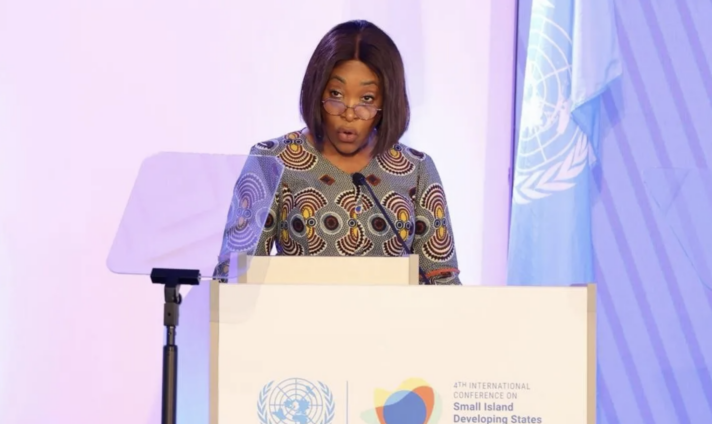Foreign Minister Shirley Ayorkor Botchwey, has addressed a forum of Small Island Developing States (SIDS) in Antigua and, alongside several leaders, advocated strongly for change to the structure of the international financial system to protect vulnerable nations.
“Ghana is committed to the fight of the SIDS because it is right, it is necessary, and because we have the moral duty to do so,” Ms. Botchwey told the gathering which included UN Secretary-General Antonio Guterres, and leaders from all over the world.
“Ghana urges support for the 2022 Bridgetown Initiative for the Reform of the Global Financial Architecture,” said Ms. Botchwey, referring to a global financial policy reform proposal initiated by Prime Minister Mia Mottley of Barbados whose capital city the idea is named after.
There are 39 countries categorised under SIDS, with 18 associate members. They constitute one percent of the global population, but are at the receiving end of disproportionate battering by climate disasters and stark economic conditions, due to their geographical remoteness, small populations, land size, and their citizens’ dependence on the ocean for their livelihoods.
Ms. Botchwey said: “Apart from the vulnerabilities we share as a result of climate change, and the solidarity we feel for the SIDS as the most impacted, we are in this together. The success of SIDS would be the success of the entire globe. We are committed to their fight for resilience.”
SIDS were recognised as a special case both for their environment and development at the UN Conference on Environment and Development in Brazil 32 years ago.
“SIDS face high import and export costs for goods and irregular international traffic volumes. Yet, they must rely on external markets for many goods due to the narrow resource base,” a UN office, dedicated to SIDS, Landlocked and Least Developing countries, explains on its website.
The Bridgetown Initiative suggests a desperate and widely-acknowledged need for adequate funding for climate action, which would simultaneously close the large infrastructural gaps that plague low- and middle-income countries, in order to achieve a more equitable and sustainable future for all.
Ms. Mottley, who commands rock-star status at international public forums, agreed with Ms. Botchwey, saying: “We must build a more responsive, fairer and more inclusive global financial system, and we must do so with pace and with scope. Speed and scope are what is missing.”
She said Ghana was in support of the call for debt relief by creditor countries and increased concessional finance and investment in SIDS.
Ms. Botchwey reminded her audience that a large number of SIDS were linked by blood with Africa including, in particular, those in the Caribbean, which has been categorised by the African Union (AU) as one of its six regions.
Ghana was heartened by the significant deepening of partnerships with the Caribbean, including through bilateral trade and investment agreements, technical cooperation and exchange of best practices and membership of the African Development Bank (AfDB) and Afreximbank, she said.
The key policy lesson from recent records of how the most vulnerable countries had performed is that “business as usual is no longer a viable option,” Ms. Botchwey said.
“Continuing to apply the past models of development will not usher in the achievement of new outcomes. Building the economic resilience of developing countries, and SIDS in particular, is the imperative of our time.”
Ghana also chairs the Climate Vulnerable Forum (CVF), comprising 68 of the most climate-vulnerable countries in Africa, Asia, the Caribbean, Latin America and the Pacific.
In April, VCF Finance Ministers meeting on the sidelines of the World Bank and International Monetary Fund annual Spring Meetings in Washington, DC., also called for major reforms to the international financial system to allow developing countries to access the finances needed to enable them meet climate goals.
A communique issued at the end of that meeting said high levels of external sovereign debt and debt service were crowding out the ability of governments to make the investments required to achieve their climate change and development goals.
Ms. Botchwey expressed condolences on behalf of Ghana to Papua New Guinea, following a landslide that killed and displaced thousands of people.
She also held bilateral meetings with several leaders and Ministers, including from Mauritius, Maldives,Nauru, Tsonga, Tuvalu and Antigua.
Ms. Botchwey, one of Africa’s top diplomats, is candidate for Secretary-General of the Commonwealth of Nations.
The organisation, with 56 coutries, a population of 2.6 billion and combined annual GDP of $13 trillion dollars, will choose a new leader in October. Thirty-three of its members are small states, including 25 SIDS.
Latest Stories
-
12 out of 14 districts suffering from illegal mining – Western Regional Minister
12 seconds -
Ghana ready for assembling combustion vehicles, production of electric vehicles – Energy Ministry
7 minutes -
Don’t buy contaminated food – Environmental director advises
12 minutes -
Ghana exposed to global fuel shocks amid empty oil buffers – COPEC
14 minutes -
Energy Ministry says suspension of fuel levy due to Iran-Israel tensions, soaring oil prices
17 minutes -
Mahama commends Yaa Naa for peace in Dagbon
33 minutes -
Father’s Day: Husbands must adapt to changing roles – Ebo Whyte
40 minutes -
Ghana validates first National E-Commerce Strategy
44 minutes -
Did Israel-Iran tensions prompt Ghana to rethink GH¢1 Fuel Levy implementation?
2 hours -
MP for Weija-Gbawe demands immediate completion of storm drain to end flood nightmare
2 hours -
Fuel tax U-turn reveals ‘trial-and-error governance’ – Minority
4 hours -
Abu Kassim claims Women’s Coach of the Year at Ghana Football Awards
4 hours -
Kwesi Appiah wins Men’s Coach of the Year at Ghana Football Awards
4 hours -
Jerry Afriyie wins Odartey Lamptey Future Star Award at Ghana Football Awards
4 hours -
NDC U-turn on Dumsor Levy exposes hypocrisy, says Afenyo-Markin
4 hours

